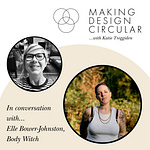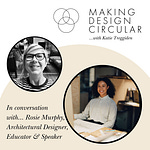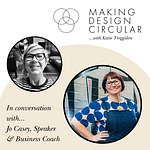In this episode, Katie is joined by Laura Eigel PhD, the founder of The Catch Group, a leadership coaching firm accelerating women into the C-suite, and the host of the You Belong in the C-Suite podcast. Known for her direct feedback and her passion for living a life guided by her values, she has been an HR executive at Fortune 50 companies, joined the C-suite as a Chief Learning Officer, and now coaches high-achieving women to build fulfilling lives inside and outside of the boardroom. She's also a mom, wife, and true-crime podcast fan who loves indoor rowing.
You can connect with Laura below:
www.thecatchgroup.com (you will find her free Values worksheet in the footer of this site)
LinkedIn: @lauraeigel
Insta: @thecatchgroup
Katie and Laura discuss,
How being aligned to our values can make us be more successful in business
Laura’s six-part Values First framework
How to get clarity around what your values are
Why your values shouldn’t just sit on your pinboard!
What a boundary is, how we set them, how we enforce them, and how they help to create businesses that are in alignment with your values when it comes to sustainability and environmentalism
The importance of uplifting others by modelling behaviours and getting the support of your community
The red flags that might suggest the situation is not in alignment and what are some of the traps we can fall into that move us out of alignment and into conflict
How we can navigate conflict of values
How we can run values aligned creative practices for the long haul
Here are some highlights:
The six-part Values First framework
“So it spells out values, and the V for Values is all about identifying your values, the A stands for Audit Time so just identifying like, what, how am I spending my time, is it aligned with my values or not? The L is for Life Boundaries and that's a really important, I think we should dig into a bit in our conversation today. And it's all about how you create, you know, systems and routines that align with your values in any way, and the U is for Uplifting Others and that's the idea of modelling it other for others, right to create those cultures. And E is for Experiencing Conflict, so it's not going to be, you know, if it's when we experience conflict, and I find that it's a lot of internal conflict, not just external conflict. And so how do you navigate through your values, and there's some ways to do that. And then S is for Sustaining Values and this idea that it's an ongoing journey, and you're never really done, it's always about what and how to dig in to what matters most to you now, and that next time in your life.”
Boundaries are not about other people, they are about you!
“When I ask people, “What do you think a boundary is?” generally people say, it's kind of a wall or restriction or a guideline or a hard line. I really like to think of it in a different way. And so if you think about your values, you have that in the centre. And then I think about like holding my values in my hand, and your boundaries are your hands. And it kind of creates care for your values. And that's really what I want you to do with boundaries, I want you to create care for yourself, for what's important. And so that can look like a lot of different things. That could look like who you work with, it could look like how you make decisions, it could be how you spend your time, right. And so as a business owner, it could be all of those things, it could be none of those things, it could be a mindset, it could be the story that you tell yourself.“
A decision doesn't have to be a lifetime one, it's okay to do things in a different way
“I used to like to do this, but I don't like do it anymore. We don't have to, once we do something, once we make a decision, we do not have to say it and do it forever. And so that's another kind of knowing, sometimes it's your body, sometimes it's just like procrastination, sometimes it's something else. But I think we do a lot of things for lots of different causes that might mean giving time or money or both, or whatever it is. And a decision doesn't have to be a lifetime one. And it's okay to do things in a different way. And so I think one of the things that we can do is to think about, if we feel like I'm not super excited about this thing I used to be really excited about, like, why is that? And to kind of dig into that. I think that's a big thing for business too. Right? So just because you did it this way in the past, do you have to do it in the future?”
Books & Podcasts we mentioned:
The Waymakers by Tara Jaye Frank
Spread the Word:
Please share Circular with Katie Treggiden with wild abandon — with your friends, family, and fellow designer-makers or wherever interesting conversations about creativity happen in your world!
If you love what you’re listening to, show me some love by following Circular with Katie Treggiden in this app and leaving a review. I’ll be honest, I don’t really understand how it works, but apparently, all that good stuff tells the ‘algorithm Gods’ to show the podcast to more people, and that can only be a good thing, right?
And finally, sign up for our my e-newsletter ‘Weekly(ish) Musings for Curious, Imperfect and Stubbornly Optimistic Environmentalists’ landing gently in inboxes most Fridays - just click here. And find me on the Interwebs: @katietreggiden.1 (Instagram), @katietreggiden (Twitter, TikTok), & @katietreggiden3908 (YouTube). If you’re a designer-maker, DM me a ♻️ to be added to my close friends group especially for sustainable craftspeople and check out Making Design Circular at www.katietreggiden.com/membership
About Katie:
Katie Treggiden is a purpose-driven journalist, author, podcaster and keynote speaker championing a circular approach to design – because Planet Earth needs better stories. With 20 years' experience in the creative industries, she regularly contributes to publications such as The Guardian, Crafts Magazine, Design Milk and Monocle24. She is currently exploring the question ‘can craft save the world?’ through an emerging body of work that includes her fifth book, Wasted: When Trash Becomes Treasure (Ludion, 2020), and this podcast.
About our partners:
Inhabit hotels, located in the Bayswater area of London, offer restorative environmentally and socially conscious places to stay in the city. Wellness and well-being also play a major part in the brand's ethos Mindfully designed for the modern traveller, everything at this new hotel has been considered with a genuine commitment to environmental initiatives and meaningful community partnerships. To find out more please check out our Instagram @inhabit_hotels.
Surfers Against Sewage is a grassroots environmental charity that campaigns to protect the ocean and everything that the ocean makes possible. They campaign against everything that threatens the ocean; plastic pollution, the climate emergency, industrial exploitation, and water quality, by taking action on the ground, that triggers change from the top. If like me, you'd like to support surfers against sewage, head over to https://www.sas.org.uk/














Share this post